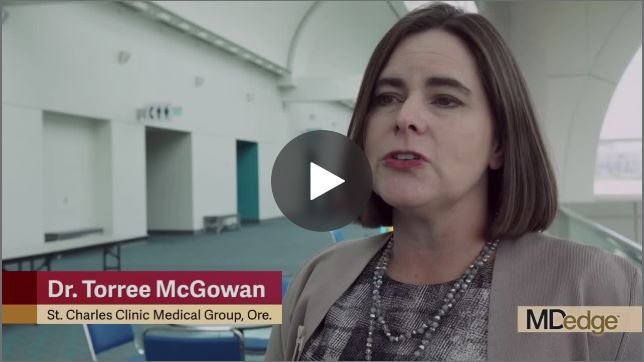User login
, according to Dr. Toree McGowan, an emergency physician who works in a critical care facility in rural Oregon.

In our video interview at the annual meeting of the American College of Emergency Physicians, she outlined key strategies for obtaining resources and delegating care when managing mass casualties from disasters.
Dr. McGowan of the St. Charles Medical Group, Culver, Ore., said that, although she is the only physician at her rural critical care center about 70% of the time, she has established plans in place for obtaining additional staff and resources in the event of disasters. During her time in the military, she was among a team that implemented a disaster plan after a toxic chemical release at a nearby factory. The response was effective because the threat had been anticipated and a plan was in place. To develop the skills and strategies she describes in this interview, Dr. McGowan recommends free training that is available from the nonprofit National Disaster Life Support Foundation.
, according to Dr. Toree McGowan, an emergency physician who works in a critical care facility in rural Oregon.

In our video interview at the annual meeting of the American College of Emergency Physicians, she outlined key strategies for obtaining resources and delegating care when managing mass casualties from disasters.
Dr. McGowan of the St. Charles Medical Group, Culver, Ore., said that, although she is the only physician at her rural critical care center about 70% of the time, she has established plans in place for obtaining additional staff and resources in the event of disasters. During her time in the military, she was among a team that implemented a disaster plan after a toxic chemical release at a nearby factory. The response was effective because the threat had been anticipated and a plan was in place. To develop the skills and strategies she describes in this interview, Dr. McGowan recommends free training that is available from the nonprofit National Disaster Life Support Foundation.
, according to Dr. Toree McGowan, an emergency physician who works in a critical care facility in rural Oregon.

In our video interview at the annual meeting of the American College of Emergency Physicians, she outlined key strategies for obtaining resources and delegating care when managing mass casualties from disasters.
Dr. McGowan of the St. Charles Medical Group, Culver, Ore., said that, although she is the only physician at her rural critical care center about 70% of the time, she has established plans in place for obtaining additional staff and resources in the event of disasters. During her time in the military, she was among a team that implemented a disaster plan after a toxic chemical release at a nearby factory. The response was effective because the threat had been anticipated and a plan was in place. To develop the skills and strategies she describes in this interview, Dr. McGowan recommends free training that is available from the nonprofit National Disaster Life Support Foundation.
REPORTING FROM ACEP18
